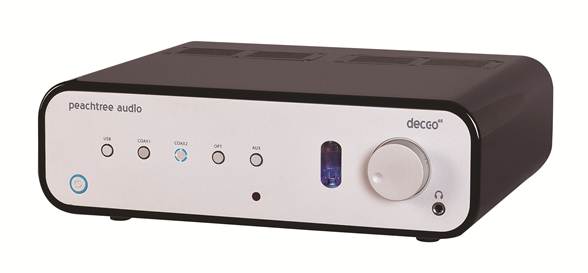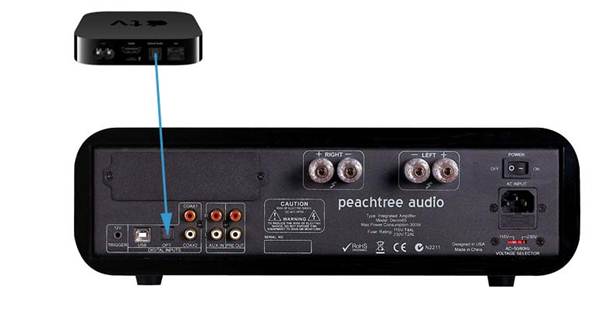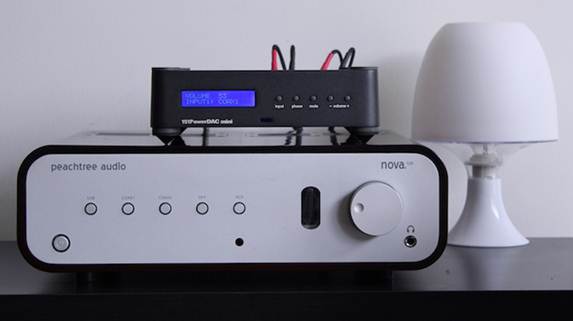If you’re after an integrated amplifier with a difference,
Peachtree Audio’s decco65 is an automatic choice.
Hi-fi was born not long after dinosaurs strode the earth,
and do you know what? It hasn’t changed much since then. The concept, I mean.
Few manufacturers have strayed far from the time-honored concept of hi-fi
separates, where one box does one thing and another does another, and never the
twain shall meet.

Peachtree Audio
decco65
Peachtree Audio is one of the few that has ‘jumped the
shark’; it too does hi-fi separates, but they’re far more focused on the needs
of the end user than the comfort zone of the manufacturer. Although it’s not
quite so revolutionary now, this company was one of the first to make
amplifiers with DACs in, and the decco65 is precisely this. A very
user-friendly device; it has two coaxial digital inputs, one optical and one
USB, plus a line-in for analogue sources.
To my eyes, it isn’t quite an aesthetic triumph, but its
rounded edges, sleek piano gloss black finish and sparkly silver painted alloy
fascia owe more to the Apple iDevice generation than the seventies – something
you can’t say about the bulk of £1,000 amps. Construction quality is very good
and the ergonomics excellent; there are no fiddly switches or complex controls,
but there is one feature that stands out from the crowd.
Behind a little window towards the right of the unit,
there’s a small 6N1P stereo triode valve on display, complete with blue LED up
lighting! It’s actually a buffer in the preamp section, and not of enormous
importance, but I rather like this playful touch – at least it shows a bit of
original thinking! Doubtless the hi-fi purists will be scoffing into their real
ale, and muttering things about getting a ‘real’ valve preamp. But you’ve got
to hand it to Peachtree Audio, because people will see it as a great talking
point, something to brag about down the pub. It makes hi-fi just that little
but more fun.

The decco65 looks
like some thought has been put into its design
Inside the interestingly styled casework is a DAC, a
preamplifier and a power amp. First things first, and the designer has chosen
an ESS Sabre 9023 DAC to do the number crunching. This is a well-respected
little chip, one that Audio lab – for example – has had much success with. It
provides 24/192 asynchronous USB, which is all you need if you’re serious about
hi-res; precious few Peachtree customers will lament the lack of DSD
compatibility, I suspect. The Class a preamplifier stage offers four digital
inputs in total, all of which are galvanic ally isolated to stop electrical
noise entering. Oh, and there’s a single analogue line input for your phonon
stage or tuner. Another useful feature has to be the Class A headphone amplifier
output via the tube, which automatically mutes the speakers when a 6.3mm jack
plug is inserted.
The power amplifier uses a Texas Instruments TI 5630 Class D
amp chip to give a claimed 65W RMS per channel into 8 ohm speakers, and 95W
into 4. Class D is, of course, a highly efficient way of producing power, and
because it doesn’t waste much energy as heat, more power can be generated in a
more compact space. That said, it has its detractors who find the sound can be
sterile. Ultimately, of course, it isn’t the mode of operation that determines
this – it isn’t what you do, it’s the way that you do it. But it’s interesting
to note that the company says the decco65 “has the sonic signature of a great
A/B amp”.
Sound quality

The wood wrap
looks at home everywhere
Here’s a genuinely smooth, open and enjoyable sounding
little amplifier, one that should win many friends – especially those looking
for simplicity and easy listening. Fundamentally, the decco65 has a clean and
fairly neutral sort of sound; you won’t find a massive bass bloom here or a
treble peak there. Instead, whether or not you choose to switch the triode
buffer into the circuit, you get a clean and direct rendition of the music that
you ask it to play.
That’s not to say this Peachtree Audio amp is totally devoid
of character; no amplifier has yet been invented about which you can say that.
Rather, what the decco65 does add to the music is pretty benign and what it
takes away isn’t critical. The end result is a nicely listenable product that gives
you service with a smile, whenever you ask it to. For example, Micro Disney’s
Loftholdingswood is a fairly rough and ready sort of recording; you only want
to listen to it because it’s a great slice of eighties indie pop. Feed the
output of an Audio lab 8200A CD player direct into this amp’s line input and
you hear a surprisingly wide soundstage, with lots of detail, and a good deal
of energy, too. There’s more power than the on-paper figures suggest; certainly
the 65 doesn’t run out of puff too easily with Acoustic Energy AE 305 floor
standers to partner it.